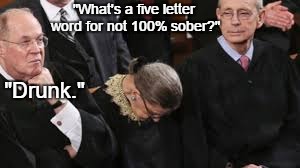Mark Graber - 50 Ind. L. Rev. 141 (2016)
https://journals.iupui.edu/index.php/in ... view/21438Ideological parties, elite polarization, divided government, and electoral instability unmoor the course of judicial decision making from the structure of partisan competition. Ideological parties and elite polarization fuel efforts to secure partisan control of the courts. Electoral instability and divided government prevent either party from claiming a durable mandate to make their constitutional vision the law of the land. In this political universe, neither party can contain a stable judicial majority, but each party controls the veto points necessary to prevent the other coalition from challenging any favorable decisions that happen to be made by the Supreme Court. Governing officials who once empowered courts to resolve certain constitutional issues are now politically disempowered from challenging particular liberal or conservative judicial decisions. Random events determine the course of Supreme Court decision making. The Supreme Court moved to the left in 2016 only because Justice Scalia happened to die before Justice Ginsburg and elected officials were too divided to either buttress the new judicial trend by confirming Judge Merrick Garland's nomination to the Court or to change the course of judicial decisions through hostile legislation. The result is an ideologically erratic course of judicial rulings on constitutional cases that is neither explained by any version of grand constitution or regime theory, nor justified by the connections to the rest of the political system necessary to support the judicial power having the final say on the meaning of constitutional provisions.
The following pages detail the changing connections between courts and the rest of constitutional politics that explain and justify judicial supremacy; how the combination of ideological parties, polarized elites, divided government, and electoral instability disconnect courts from the rest of the political system; and why, contrary to much inherited wisdom, the resulting judicial independence weakens the case for judicial supremacy in contemporary constitutional politics. The analysis integrates empirical explanations for judicial decisions with normative justifications for judicial decisions by highlighting the empirical presuppositions of grand constitutional theory and the normative ambitions of regime theory. Normative work justifies the practice of judicial supremacy in the United States, various works explicitly or implicitly acknowledge, only when theory correctly describes practice. As Karl Llewellyn observed, "[T]here is no reaching a judgment as to whether any specific part of present law does what it ought, until you can first answer what it is doing now." That judicial review is justified whenever manna falls from heaven after the justices declare a law unconstitutional is beside the point because manna never falls from heaven after justices in the United States declare a law unconstitutional.
http://mckinneylaw.iu.edu/ilr/pdf/vol50p141.pdf


